Heritage Recipes Reworked in Perfectly Golden Cookbook
(Gerry Furth-Sides) In Perfectly Golden: Adaptable Recipes for Sweet and Simple Treats Cookbook author Angela Garbacz has collected the most popular, inclusive recipes meant to fit any lifestyle, regardless of dietary restrictions. And Angela knows what is popular: she is the owner- founder of Goldenrod Pastries, a women-run pastry shop, located on a picturesque corner in Lincoln, Nebraska, where she develops recipes and bakes for people who are dietary-sensitive. You’d never know it to look at the pictures!
Pastries ranging from cookies and cakes, to an elaborate morning bun program take into consideration restrictions from dairy intolerances to gluten-free lifestyles, peanut allergies to vegan diets. Angela’s realized the need for such a bakery after her blog focusing on dietary-concious desserts took off. Goldenrod Pastries, named after the Nebraska state flower, was initially inspired by her mother’s and grandmothers’ love for baking, and her love of sharing good food,
In her words, “I did take into account new bakers, anxious bakers, and seasoned bakers. I had recipe testers from all categories and had one person in particular who fits in the “very anxious baker” category. I hoped by including these different groups, I could answer questions that many different types of bakers would have. I wanted to answer questions that, as a professional chef, I wouldn’t think to ask or answer. I’ve had so so so many people reach out who have never baked before and, because of quarantine, have been trying recipes they never would have tried before. It’s been really satisfying and fun to hear that they’ve been successful through all chapters of this book as totally novice bakers!
When I emailed Angela with my questions that were not answered in the book, she responded within a day with very helpful answers. I had asked what to do if chocolate wasn’t melting and told her I finally created a makeshift double-boiler. Her thoughtful response: “If it seems like chocolate takes a while to melt (more than a few minutes), it has already passed the stage of melting and has gone into burning. Great to hear that the double boiler method worked for you! I just never want to dirty more pans at home (lazy home baker), so always look for alternatives that use the least amount of dishes possible! I admire your dedication to making a double boiler work!
I was wondering why there was an X in the boxes because I thought this meant it would not work for the restriction. Angela: I define the You Do You key on page 44, and especially wanted to include this bit: “If there is no listing for your particular dietary requirement, it means this recipe should not be made with any alternative ingredients – but there are plenty of other delicious recipes in the book that will meet your needs.” I included that because, for example, the Egg-Free Bun Dough really doesn’t work well with gluten-free flours. It just isn’t very delicious – so I made sure not to check that box, and made a second bun dough recipe that is great as a gluten-free recipe. This way a home baker is able to make the recipe in the manner they need, so long as the box is checked. As a person who has to be dairy-free, this was a super important section to include in the book for me – and one that I am really passionate about! The recipes are written to follow the checked boxes in that section – if you do need to make it gluten-free, for example, the gluten-free flour I recommend for each recipe is in the Angela Says section.
It’s important to use the chocolate while it is still warm, but not hot. We usually make these in the wintertime at the bakery, for holiday cookie boxes, and if the chocolate cools too much, we have to rewarm it. When you add room temp melted chocolate to the batter, it will harden almost immediately.
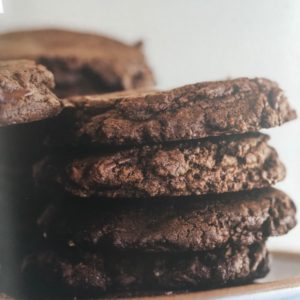 If you use warm, melted chocolate, it will make a smoother, not-so-thick batter. They tend to spread more, and crinkle on top, when the chocolate isn’t cooled too far down.
If you use warm, melted chocolate, it will make a smoother, not-so-thick batter. They tend to spread more, and crinkle on top, when the chocolate isn’t cooled too far down.
Finally I asked about her collecting all the recipes she learned from her mom and grandmother. She answered, “Why’s it so hard to just sit down and write ‘em all out – or at least some of them? I wrote several this weekend, and it was actually really delightful. My mom’s recipe box is massive. It’s really long, like the card catalogs we had in libraries (P.S. do those still exist?) and is packed with cards she wrote and those her mother, aunts, and other friends wrote. It’s a treasure chest of history, great recipes, and a piece of our family’s past. When I was writing down some recipes from my mom today, one said to “cook the dates until they cook up good.” That’s the kind of stuff we need to pass on. Cooking things up good. I think it’d be nice to have everything written down. If we don’t preserve history, who will?

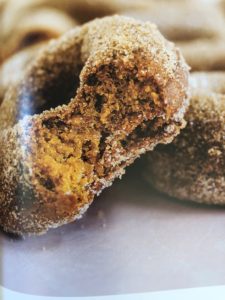
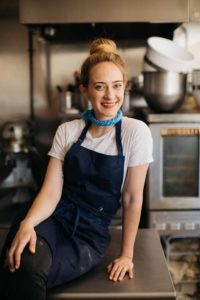
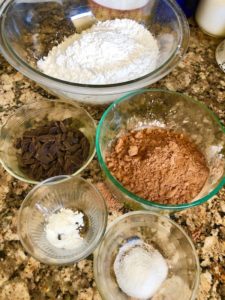
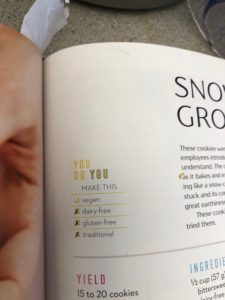
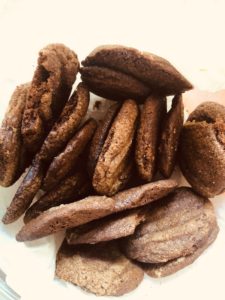

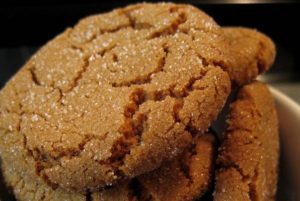
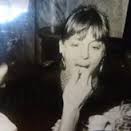 Gerry Furth-Sides
Gerry Furth-Sides 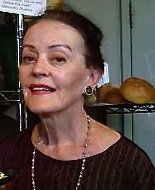 Barbara Hansen
Barbara Hansen 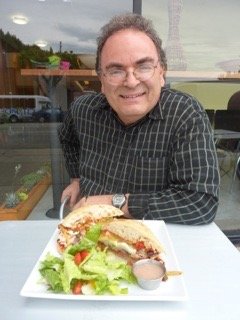 Chef-owner Alain Cohen
Chef-owner Alain Cohen  Roberta Deen
Roberta Deen  Jose Martinez
Jose Martinez  Nivedita Basu
Nivedita Basu